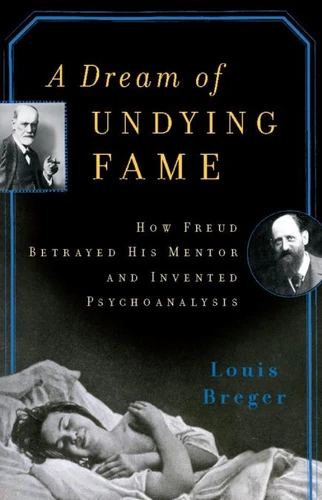A Dream of Undying Fame. How Freud Betrayed His Mentor and Invented Psychoanalysis
Par :Formats :
Disponible dans votre compte client Decitre ou Furet du Nord dès validation de votre commande. Le format ePub protégé est :
- Compatible avec une lecture sur My Vivlio (smartphone, tablette, ordinateur)
- Compatible avec une lecture sur liseuses Vivlio
- Pour les liseuses autres que Vivlio, vous devez utiliser le logiciel Adobe Digital Edition. Non compatible avec la lecture sur les liseuses Kindle, Remarkable et Sony
- Non compatible avec un achat hors France métropolitaine
 , qui est-ce ?
, qui est-ce ?Notre partenaire de plateforme de lecture numérique où vous retrouverez l'ensemble de vos ebooks gratuitement
Pour en savoir plus sur nos ebooks, consultez notre aide en ligne ici
- Nombre de pages216
- FormatePub
- ISBN978-0-465-01988-5
- EAN9780465019885
- Date de parution24/08/2009
- Protection num.Adobe DRM
- Infos supplémentairesepub
- ÉditeurBasic Books
Résumé
In 1877, a young Freud met an established physician named Josef Breuer and they began a collaboration that would lead to the publication of the classic work, Studies on Hysteria. But by the time it released, Freud was moving to establish himself as a major figure in the treatment of mentally ill patients, and would let no one stand in his way. He consequently minimized Breuer's contributions, betraying his former mentor and benefactor.
In A Dream of Undying Fame, renowned psychologist Louis Breger narrates the story behind the creation of Studies as well as the case of Anna O., which helped contribute to Freud's definition of "neurosis." Breger reveals that Freud's own self-mythologizing and history not only affected everything he did in life, but also helped shape his emerging beliefs about psychoanalysis. Illustrating the importance of personality and social context behind an intellectual breakthrough, Breger provides an in-depth look at a field that reshaped our understanding of what it means to be human.
In A Dream of Undying Fame, renowned psychologist Louis Breger narrates the story behind the creation of Studies as well as the case of Anna O., which helped contribute to Freud's definition of "neurosis." Breger reveals that Freud's own self-mythologizing and history not only affected everything he did in life, but also helped shape his emerging beliefs about psychoanalysis. Illustrating the importance of personality and social context behind an intellectual breakthrough, Breger provides an in-depth look at a field that reshaped our understanding of what it means to be human.
In 1877, a young Freud met an established physician named Josef Breuer and they began a collaboration that would lead to the publication of the classic work, Studies on Hysteria. But by the time it released, Freud was moving to establish himself as a major figure in the treatment of mentally ill patients, and would let no one stand in his way. He consequently minimized Breuer's contributions, betraying his former mentor and benefactor.
In A Dream of Undying Fame, renowned psychologist Louis Breger narrates the story behind the creation of Studies as well as the case of Anna O., which helped contribute to Freud's definition of "neurosis." Breger reveals that Freud's own self-mythologizing and history not only affected everything he did in life, but also helped shape his emerging beliefs about psychoanalysis. Illustrating the importance of personality and social context behind an intellectual breakthrough, Breger provides an in-depth look at a field that reshaped our understanding of what it means to be human.
In A Dream of Undying Fame, renowned psychologist Louis Breger narrates the story behind the creation of Studies as well as the case of Anna O., which helped contribute to Freud's definition of "neurosis." Breger reveals that Freud's own self-mythologizing and history not only affected everything he did in life, but also helped shape his emerging beliefs about psychoanalysis. Illustrating the importance of personality and social context behind an intellectual breakthrough, Breger provides an in-depth look at a field that reshaped our understanding of what it means to be human.



